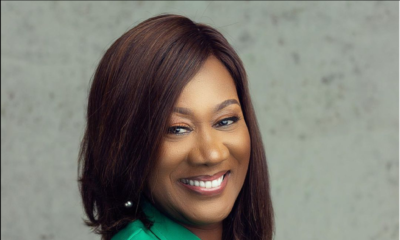Features
Tomie Balogun: What Millennials are Thinking About Investment
 ‘‘I’m not sure I understand why I need to think about my pension now,’’ she asked. ‘‘I am a final year student looking forward to graduating and earning an income in a few months. This is all I am thinking about right now. Can you please explain why thinking about my pension is important?’’
‘‘I’m not sure I understand why I need to think about my pension now,’’ she asked. ‘‘I am a final year student looking forward to graduating and earning an income in a few months. This is all I am thinking about right now. Can you please explain why thinking about my pension is important?’’
This was at an event in one of the Universities in Nigeria. I was one of the speakers on the panel, and each of the panelists had shared their personal stories on financial literacy, entrepreneurship, career development. The stories we shared inspired questions and this was one of the interesting ones.
As I listened to this student speak, I thought her question was typical of the way my generation thinks. I also thought it was a valid question, as she honestly wanted to understand why she should think about a future that was 40-50 years away when she has dreams and aspirations for a shorter time period.
The other members of the panel and I did our best to provide answers to this young lady on why it wasn’t too early to start thinking about mastering money management, and why she needed to seize the opportunity to learn as much as she could from all the members of the panel.
However, for some reason, that question stayed with me. Questions like this might seem unimportant next to the wave of overwhelming information on financial literacy accessible on the internet.
Yet, sitting on a panel with other professionals and experts on a rainy day in the south-south area of Nigeria, I realized that questions like that help us get into the minds of the current generation of millennial investors in Nigeria and possibly Africa.
Let’s get into their minds, shall we?
An estimated 50% of the current population in Nigeria are aged 30 or less. This group consists largely of millennials who were born between the years 1981-2000. According to behavioral experts, millennials are incredibly sophisticated, technology wise. They are also immune to most traditional marketing and sales pitches as they not only grew up with it all, they have seen it all, and have been exposed to it all since early childhood. They are also less brand loyal as the speed of the Internet and influence of social media make them super flexible in fashion, style consciousness and travel.
Prior to the tour of 5 universities, I carried out a survey on 200+ final year students of a university in Lagos and I found the answers to the survey very interesting. When asked the question, Have you considered investing before? 90% of respondents selected the option, I have considered investing but I do not invest because I do not understand how it works.
Digging further, it became clear that a lack of information was not the problem. If they really cared to learn about investing, they could simply search the internet for information. I did a google search on how to invest in Nigeria and the search engine brought up 36 million results. So, the problem is not a lack of information. The problem is they don’t see how all the overwhelming information can directly help them achieve their lifestyle goals.
Over a period of 2-3 years, I have worked with 4000+ young millennials in Africa who read my weekly emails, attend my investment workshops or read my recently published book on investment clubs, and the rhetoric is similar. On the recent campus tour with Pensions Alliance Limited, I had the opportunity to speak to at least 10,000 students in 5 universities across Nigeria, and after each event, quite a number of the students filled my inbox with the same questions: How can investing help me achieve my goals? How can I start investing right away?
They say I don’t really think about retirement because it seems really way off in the future. Talk to me about financial freedom instead. How can I work, save and travel the world on a budget? How can I pay my bills and still chill? How can I own a house in my 30s and not have to wait till my kids are all grown up? How can I tick off all the plans on my bucket list? How can I earn passive income? How do I build an investment portfolio that captures my passion for impact, tech, or any other interests? How do I build a business that increases my net-worth? Can you help me achieve this or am I just a statistic for your organization’s bottom line?
I believe this was that student’s heartfelt question to the members of the panel: how can you help me achieve my financial goals so I can live life on my own terms?
How should this question change the current financial landscape?
The current financial landscape consists of core financial institutions that are innovative with digital technology and some who are largely playing catch up with the industry leaders. We also have a new crop of digital players gaining incredible ground on the local financial landscape in Africa and giving the incumbents a run for customers. However, the question remains, are they all doing enough?
The millennial investor doesn’t simply want to be a performance index on an organization’s financial statement. They want financial products that help them achieve their lifestyle goals and educate them on how best to achieve financial freedom.
I find myself incredibly impatient with traditional marketing pitches to simply open a bank account with another financial institution. I own 5 bank accounts, most of which were opened to do an account officer a favour. At first, it seems like a good idea, but after a while, you realise all they need you to do is simply open the bank account and stack up cash to earn interest below the prevailing inflation rate.
Over the past decade, we have seen the traditional financial industry disrupted by multiple technology companies in more developed economies. The use of smart phones for investing services by companies like Betterment, Wealth front, Stash, Acorn in the USA are great examples of how technology is helping millennials move from traditional institutions to digital institutions. These digital institutions offer a simple platform to invest money conveniently in investment options that millennials care about.
In Africa, we have seen significant growth in technology enabled industries such as mobile banking and the payments industry. We see this in Nigeria as well, with applications like Piggybankng offering automated money saving features and i-invest.ng offering lower price points for millennials to invest in treasury bills. However, we need more of them speaking the millennial language. The millennial language is YOLO (you only live once) and FOMO (fear of missing out). Our lives need to be lit with squad goals i.e. we want to do what our friends are doing, so even if you throw shade, we’ll be fine.
Millennials in Africa want a balance: a good mix of short term interesting investing products and long-term options. We won’t mind considering what happens in 40 years as long as we don’t miss out on the joys of the present. We love our squad of friends so we’ll collaborate to achieve our goals in a hurry. We want our lives to be lit sometimes, so give us a good outing while you teach us about making responsible money decisions.
Basically, speak our language and show us the path to financial freedom so we can hear you loud and clear.
For me, the best part of the campus tour was confirming how different millennials are, in terms of tribe and geographic location, yet how similar we are in terms of our financial language and needs. I am glad I got to experience this and I am excited about the changes this will bring to the financial landscape in Africa, specifically Nigeria.




















